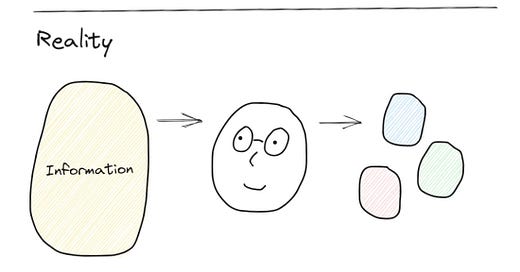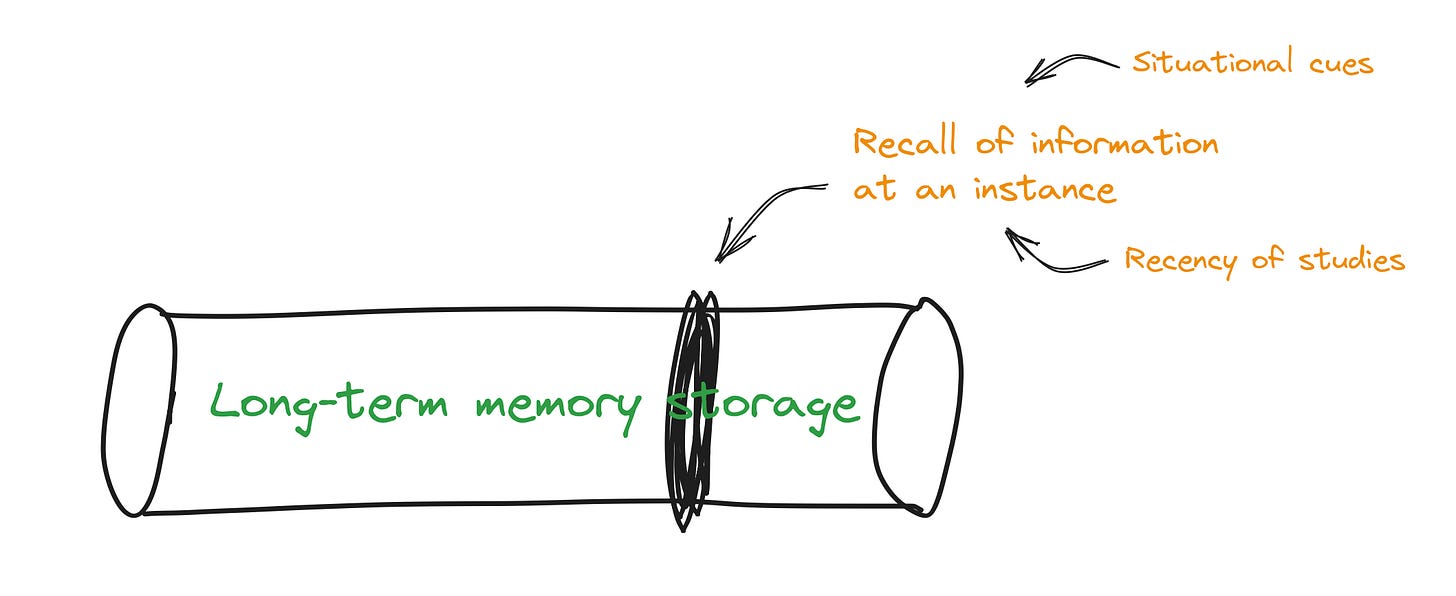☕ debunking myths about learning
as learners, we are easily misled as to whether we are learning effectively. 4 common assumptions about learning are:
1. we often assume that our brain is an automatic recorder:
as we go through learning materials, we often assume that information we have read, listened or consumed otherwise will be automatically logged into our memory.
but it doesn’t work like this.
our brain is far from an automatic recording that tapes everything we consume.
Ebbinghaus - a German psychologist who pionereed the experimental study of memory - conceptualised how our brain tends to forget information via the concept The Forgetting Curve.
Ebbinghaus’ Forgetting Curve refers to how newly learned information tends to decay from memory if not actively reinforced.
so, choosing which piece of knowledge or insight to remember is an active choice requiring active efforts.
2. we mistake familiarity for understanding:
often, when we read something the second time, we feel a sense of familiarity with the material. it is easy then for us to mistake this sense of familiarity with understanding and comprehension of the material.
but this is just familiarity - no more, no less.
this sense of perceptual fluency is called low-level perceptual priming.
perceptual priming happens when our brain encounter stimuli that are similar to each other - for instance, when we read 2 articles on the same topic. as our brain has already familiarised itself with the first article, we feel an increased sense of familiarity with the second article too.
but this sense of familiarity and comfort is not understanding or comprehension of the learning material.
re-reading something doesn’t guarantee comprehension. understanding a piece of knowledge, information or insight requires an active process of dissecting, making sense of and internalising the learning material.
3. we mistake instant recall of information for long-term learning:
oftentimes when we’re tested and are able to recall information on the spot, we would assume that we have successfully understood and learned the material.
but information coming readily into mind at an instance can be a product of situational cues present at the moment of recall and how recent our learning session was to that moment.
as these situational cues might not be present at a later time, and as the recency of our study decreases, we might not be able to recall the information we are once able to.
our ability to recall information is situational, and does not represent long-term retention of knowledge.
4. we try to learn a lot in a short time:
aka intensive learning. we often find ourselves in situations where we have to learn a huge amount of knowledge in a short time - exams, on-the-job training, intensive online courses, etc.
this is not the best condition for learning. think back to the last time you took an exam, how much of the knowledge you squeezed in for that exam do you still remember?
In Making Things Hard on Yourself (2011), Bjork and Bjork - 2 psychology professors of at UCLA - write about how we can easily be misled by our current performance.
“conditions of learning that make performance improve rapidly often fail to support long term retention and transfer, whereas conditions that create challenges and slow the rate of apparent learning often optimises long-term retention and transfer of knowledge across varied contexts.”
what this means is, learning is not about speed, but about durability and application. the question is not how fast you learn, but how long your knowledge stays with you and how you can apply it in the long run.
when i started to build the curriculum for my learning series, i also tried to squeeze a lot of content into 1 day. soon enough, i realised that this doesn’t work - for my schedule and for the long-term retention and application of these knowledge.
so what i need to do instead is:
start separating learning from speed, and focus instead on what to do with this knowledge in the future.
wanting to go on this learning journey with the right mindset, i start with debunking these 4 common myths about learning.
as most of us enroll in formal education, take standardised tests, and go on heavy study grinds, we have little time and space to reflect on what works and what doesn’t when it comes to learning.
also, in schools, oftentimes we study for assessment, not for learning. with the end goal of assessment, the way we approach studying in schools is different from the approach suitable for learning.
as we graduate and develop endeavors outside of schools, sometimes, we get confused as to how we should learn for the sake of learning, because our mechanisms have been conditioned for assessment.
by navigating how to learn for the sake of learning, we can make our learning journey more enjoyable and sustainable, so that what we learn stays with us.
☕
i’ve been reflecting on how i learn since primary school. there is a question i find helpful in navigating what works best for my learning. i’ll share it with you as our reflection prompt:
what is one topic you explored that left a lasting impact on you? how did you learn this topic, at the moment of learning it and afterwards? how are you able to retain a memory of what you explored?
if you want to share your reflection with me, please go ahead! would love to exchange ideas.
for now, see you in our next talk,
van
🫀







Cảm ơn tác giả vì bài viết rất hay và informative! Hình minh hoạ cũng trực quan, dễ hiểu và dễ thương nữa. Cảm giác nhờ có những tấm hình đó mà bài viết dễ đọc và dễ nhớ hơn nhiều ấy.
Câu hỏi cuối bài làm tớ suy nghĩ khá nhiều, vì như một myth trong bài viết có đề cập, cơ chế học hành của tớ được xây dựng từ việc học dồn học ép trong thời gian ngắn để làm bài thi, để interview,... nên một thời gian sau cũng quên gần hết rồi.
Nhưng trong tháng vừa rồi, có một bài viết nói về “The power of context” làm tớ thấy rằng mình học được từ nó nhiều và cũng đang trên hành trình áp dụng kiến thức từ bài viết vào tình huống thực tế.
Tớ đọc bài viết vì sự tò mò với chất lượng bài viết so với thời gian, công sức mà một bạn học viên đã bỏ ra cho nó. Nên, tớ đọc bài viết hai lần (lần đầu chỉ là đọc thôi, không nghĩ nhiều, và lần hai là đọc để hiểu) và nó thật sự rất đáng í.
Nó có tác động đến tớ vì tớ học được rằng, bất kể là thông tin/ tình huống/ con người/ câu hỏi nào, nếu không có context đi kèm, mọi quyết định hay suy nghĩ của mình đều có thể bị sai lệch.
Sau khi đọc bài viết đó, tớ có những buổi call/ tin nhắn với học viên khi họ gặp vấn đề trong việc học và viết; hay phải bước vào các buổi interview với những problem-solving cases và tớ sẽ nhắc nhở bản thân rằng “mình cần phải hiểu context đằng sau nó trước khi đưa ra bất kì nhận định nào”. Và nó giúp tớ đưa ra cách giải quyết phù hợp hơn ấy. Tuy rằng trong tình huống giao tiếp hằng ngày, khi không trong mode làm việc thì tớ vẫn chưa thật sự áp dụng được nó lắm.
Việc đọc lại hai lần giúp tớ nhớ bài viết tốt hơn.
Việc áp dụng nó vào thực tế giúp tớ biến nó thành “chất xám” của mình.